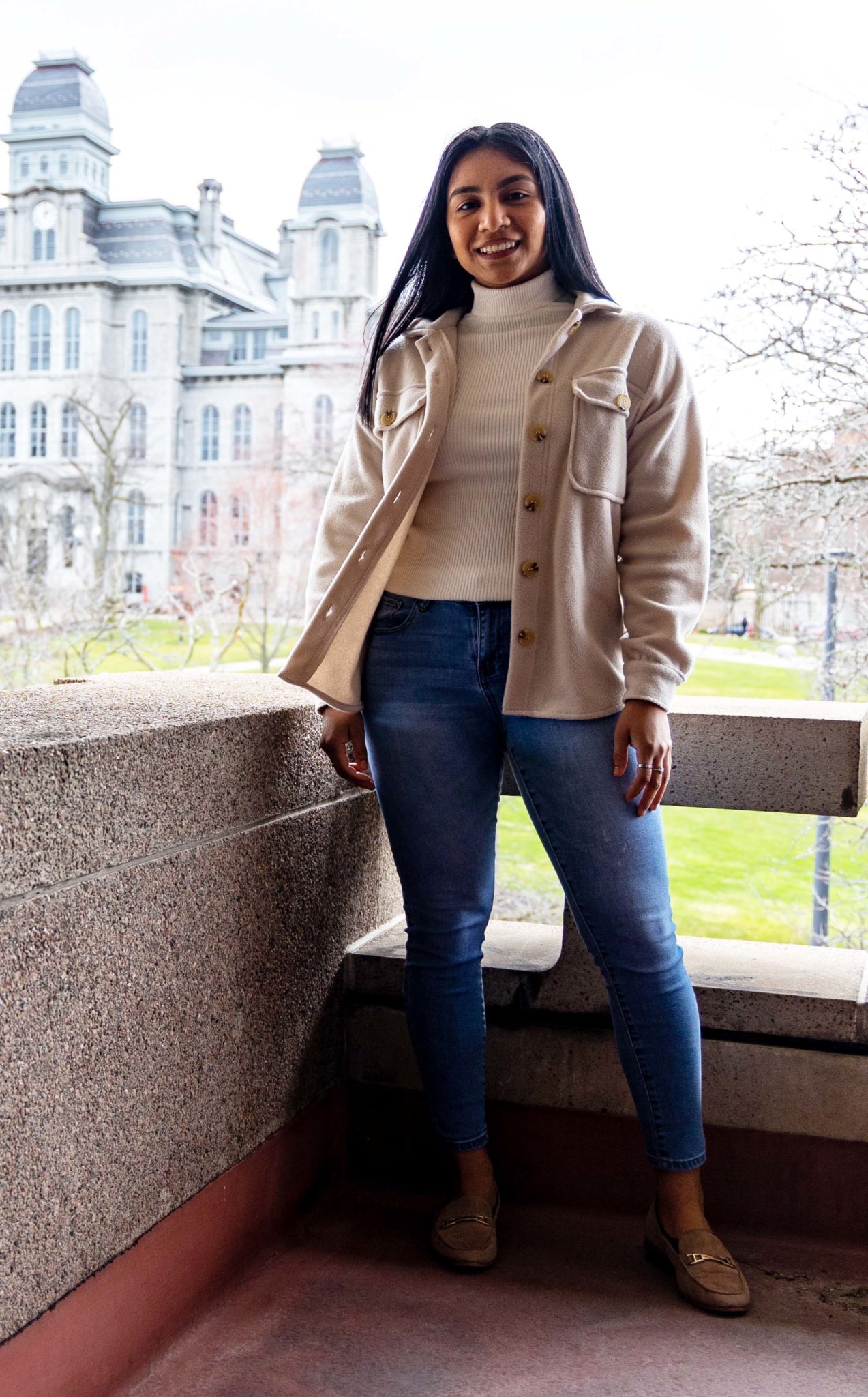Undocumented

Idalia Quinteros is a junior advertising major from Miami. She transferred to the Newhouse School after completing two years at a community college. She is a reporter on CitrusTV’s Spanish-language news program, “Noticias.” Like many Newhouse students, she wasn’t sure what she wanted to study in communications at first, but after a couple of classes, she felt her chosen major click for her.
“The thing I was worried about advertising was that I don’t consider myself a creative person,” Quinteros says, “but then I discovered, there’s this base to the creative, which is a strategic and account planning. When I started using the programs to do research on target audiences, that’s where I started seeing myself more.”
She says she loves how hands-on the professors are, and how they crack jokes and do exercises in class to illustrate concepts.
“I’m like, ‘Oh my goodness, this is what an advertising class is like, this is so fun!” Quinteros says. “I’m so down for it.”
Quinteros is like many Newhouse students in her enthusiasm and her hopes for the future, but she’s different from most Newhouse students in one fundamental way.
She’s undocumented.
“For half of my childhood, I lived in El Salvador,” she says. “I was three when my dad came to the U.S., and then my mom left a year later. I stayed with my grandparents from [the age of] four to eight years old, and then later I reunited with [my parents] here.”
Quinteros arrived in Miami in 2008, just months shy of the cutoff for Deferred Action for Childhood Arrival (DACA) status.
“I’m a Dreamer in the sense that I’m undocumented,” Quinteros says, “but not in the sense that I have DACA [benefits].”
For instance, Quinteros says, students with DACA can apply for a driver’s license. They can get social security cards, so they can work. They can apply for a credit card. But even with those benefits, students with DACA can’t get federal aid, and they can’t travel outside of the country.
“It’s a few benefits,” Quinteros says, “but you have a status.”
For Quinteros, navigating an education without even those few benefits was challenging.
“I don’t think any college or university really rejects students based on status,” Quinteros says, “but they will say, ‘We can’t give you any money.’”
Even in-state tuition can be inaccessible for undocumented students, despite having lived in these states for as long as they can remember. Quinteros was lucky; there is a law in Florida that granted her in-state tuition for community college, and she was also awarded a scholarship. Community college, however, was only for two years; if Quinteros wanted to get a full bachelor’s degree, she was going to have to transfer to a four-year school.
“I applied to the University of Miami, which is crazy expensive,” she says. “When I got the rejection email, they blatantly told me, ‘We see that you’re not a citizen and we can’t give you any aid, so we’re not going to accept you.’ That was like the first time I had gotten a rejection like that.”
A friend who had gone to Syracuse and received financial aid recommended that Quinteros apply.
“She told me Syracuse was a good school and that they helped her out financially,” Quinteros says. “Then I also found out about the schools here, which were really good, like Newhouse.”
Quinteros applied, was accepted and was offered financial aid, so she packed her bags and came to Syracuse.
Huey Hsaio, associate director of multicultural affairs, says that Syracuse University is empathetic toward students like Quinteros. “We understand that DACA/undocumented students and students with ‘mixed-status families’ might feel daunted by the challenges of navigating higher education. However, we are committed to supporting their success at the University,” Hsaio says.
But even with the support, Quinteros says that pursuing a college education is not easy. Despite having lived in the U.S. for most of her life, she has no access to federal student aid packages, she can’t get a job to pay her bills and she can’t participate in the paid internships that give her professional experience in her field. These struggles are a big part of the reason she wants to talk about her undocumented status, even though she understands there are risks involved.
“The biggest risk is my whole future… being deported,” Quinteros says. “I take the risk because if I don’t speak about it, nothing in my future is going to change.”
Quinteros is undaunted by these risks, however, because she believes in the power of communications.
“[I want to] bring more awareness,” she says. [I want to] hopefully make things better for someone, at least one person. When I tell someone and then they asked me questions, it makes me realize that I need to keep doing this so that more people can keep asking questions and more people can care about it.”
Even with the challenges she faces being undocumented, Quinteros is grateful for the opportunities she’s had, and dreams about one day having a job in the United States that will sponsor her work visa.
But, like many of her fellow Newhouse students, she’s got a few dreams about what she wants to do once she’s able to work.
“I have two dream jobs,” she says. “One is working for a sports team, maybe a women’s soccer team. [I would also love to go into] communications for nonprofits, maybe trying to do something for the undocumented community, since I’ve already set kind of my foot in there.”